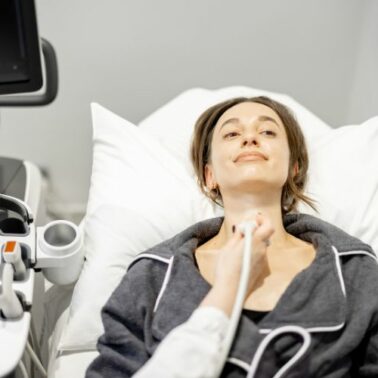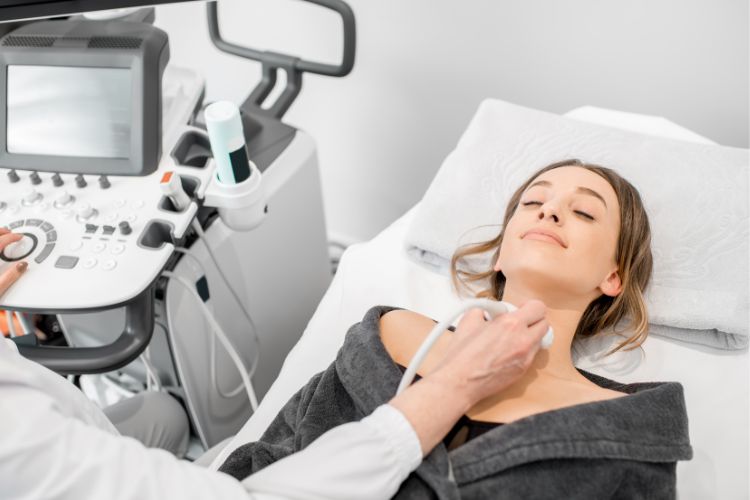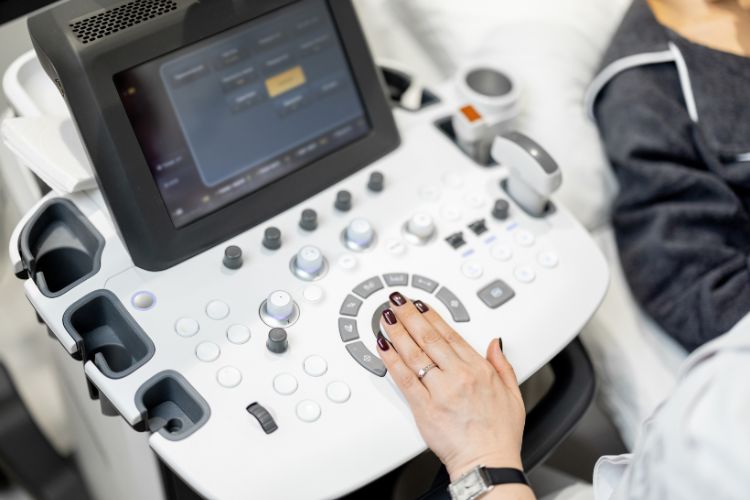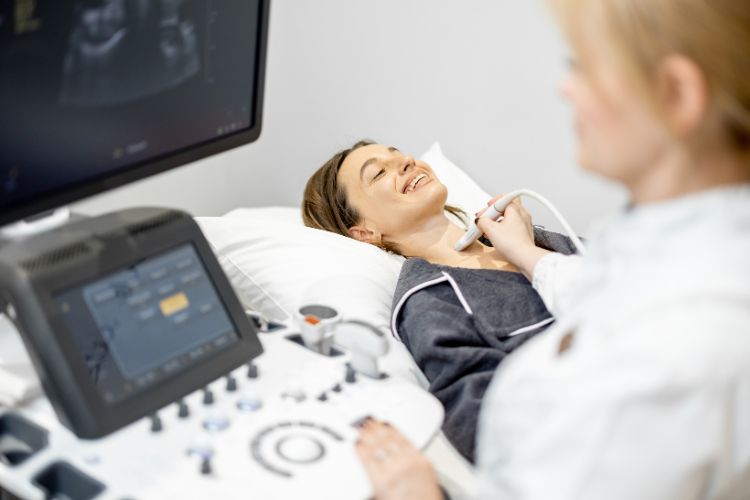
Innovative Approaches in Thyroid Healthcare
Nuclear medicine plays a crucial role in assessing thyroid health. This advanced field of medical imaging uses specialised techniques to diagnose a variety of thyroid conditions, such as hyperthyroidism, hypothyroidism, thyroid nodules and thyroid cancer.
Understanding thyroid function is key to taking care of your overall health — this small gland in your neck is responsible for regulating some essential body processes.
In this article, we’ll explore how nuclear medicine provides invaluable insights into thyroid health, offering patients and doctors a clearer picture of the body.
Understanding Thyroid Health and Common Disorders
The thyroid, a small butterfly-shaped gland in your neck, plays a vital part in regulating your body’s metabolism and energy. It produces hormones that control how your body uses energy, impacting nearly every organ.
But what happens when it doesn’t work as it should?
Common Disorders
- Hyperthyroidism: When the thyroid is overactive, releasing too much hormone. Also known as Graves’ Disease.
- Hypothyroidism: The opposite, with too little hormone production.
- Thyroid Nodules and Cancer: Growths or lumps in the thyroid, which may or may not be cancerous.
Nuclear medicine comes into play by offering early detection and accurate diagnosis of these conditions. The nuclear medicine technologist will use specialised imaging techniques to assess thyroid function and investigate any abnormalities – a process commonly referred to as a nuclear medicine thyroid scan.

What is a Thyroid Scan?
A thyroid scan is more than just an image; it’s a window into the health of your thyroid gland — and your body as a whole.
So, what is a thyroid scan? It’s a type of scan that uses a radioactive tracer injected into a vein to create detailed images of the thyroid gland. This helps in assessing the gland’s function, size, and structure.
You might be wondering what makes a nuclear medicine thyroid scan so different from other types of imaging. Unlike standard X-rays or CT scans that capture structural images, a nuclear medicine thyroid scan offers more functional insights.
It shows not just what the thyroid looks like, but how it works, tracking the tracer’s uptake into the gland to reveal its activity and health. This specialised scan is an essential tool in the evaluation and management of thyroid health and disorders.
The Process of a Thyroid Scan in Nuclear Medicine
Undergoing a thyroid scan with nuclear medicine involves a few key steps to ensure both accuracy and comfort. Let’s take a closer look:
Step-by-Step Procedure
- Injection of Tracer: The process starts with an injection of a radioactive tracer, usually sodium pertechnetate, into a vein in your arm.
- Waiting Period: After the injection, there’s a brief wait (typically around 20 minutes) to allow the tracer to concentrate in the thyroid.
- Imaging: You’ll lie still as a gamma camera takes images of your thyroid. This process should last around 15–40 minutes.
Preparation and Aftercare
- Before the Scan: Avoid certain medications and iodine-rich foods, as they can affect the scan results.
- Post-Scan: You can resume normal activities immediately. Stay hydrated to help clear the tracer from your body.
Patient preparation and proper aftercare are both crucial for a successful nuclear medicine thyroid scan. They help ensure accurate results and patient well-being. If you have any questions or you’re looking for more information on thyroid scans and tests, reach out to PRP’s experts or your doctor.

Advancements in Nuclear Medicine for Thyroid Health
Nuclear medicine for thyroid health has seen some remarkable advancements, bringing new levels of precision and effectiveness to patient care. Here’s how:
Technological Progress
- Enhanced Imaging: Recent developments include more sophisticated gamma cameras and 3D imaging techniques. These provide clearer and more detailed thyroid images, meaning more accurate diagnoses and treatment.
- Precise Tracers: Advances in radioactive tracers offer more accurate targeting of thyroid tissue, improving the diagnosis for a range of conditions.
Benefits for Patients
- Improved Diagnosis: These technological strides mean more accurate diagnoses and treatments, from pinpointing a condition like thyroiditis to identifying thyroid cancer early.
- Tailored Treatment: With enhanced imaging, doctors can better tailor treatments to individual patient needs. This leads to more effective therapy and improved outcomes.
These advancements underscore nuclear medicine’s critical role in thyroid health, ensuring that patients receive the most accurate and advanced care available.

Comparing Nuclear Medicine to Other Imaging Modalities for Thyroid Health
Nuclear medicine offers unique advantages over other imaging techniques like MRI and CT scans, especially when it comes to thyroid health. Let’s compare:
Effectiveness and Accuracy
- Nuclear Medicine: Excels in detecting and assessing thyroid disorders due to its functional imaging capability. It’s highly effective in identifying thyroid dysfunction and disease, from hyperthyroidism to a cancerous nodule.
- Ultrasound: Can be used for the initial evaluation of thyroid nodules, but it lacks the functional data provided by nuclear medicine.
- MRI and CT Scan: While offering detailed structural images, they may not always provide the same level of functional detail about thyroid activity.
Safety and Risks
- Nuclear Medicine: The risk of side effects is low, with minimal radiation exposure. It’s particularly preferred for women and patients where detailed functional information is crucial.
- MRI and CT Scan: An MRI is safe but may not be suitable for all patients (e.g., those with certain implants). CT scans involve higher radiation risks.
In many cases, especially when detailed data on thyroid function and factors affecting thyroid disorders are needed, nuclear medicine is the preferred test.

The Future of Thyroid Health Management Through Nuclear Medicine
Nuclear medicine has cemented its role in managing thyroid health. It offers some exciting, very promising pathways for future developments. Here’s a glimpse into the future of thyroid health management with nuclear medicine:
Current Impact
- Nuclear medicine, through the use of a radioisotope like technetium, has revolutionised the diagnosis and treatment of conditions like goitre and thyroid nodules, often reducing the need for surgery.
- It precisely pinpoints areas of concern within the thyroid, aiding in pain management and determining the appropriate dose of treatment.
Looking Ahead
- Ongoing research is focusing on refining the use of radioisotopes to minimise the dose while maximising diagnostic accuracy.
- The development of new tracers and techniques aims to improve the detection of thyroid cancer and other disorders in people, expanding the number of treatable conditions.
- The search for more targeted therapies continues, ensuring more personalised and effective care for a greater amount of patients.

Taking the Next Step in Thyroid Health Care
If you’re facing thyroid health concerns, remember that nuclear medicine could be an invaluable tool in your diagnosis and treatment journey. Don’t hesitate to consult with healthcare professionals to explore this option further.
If you have any questions or you want to schedule a thyroid scan, PRP Diagnostic Imaging is here to help you. Visit your nearest clinic or book an appointment online to take the first step towards comprehensive thyroid care.
Our dedicated team is ready to support and guide you through each stage of the process, making sure you receive the best possible care for your thyroid health.
